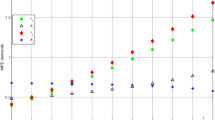Abstract
We consider a two-player bargaining model in which one or both players have reference-dependent preferences, but are otherwise perfectly rational. Our behavioural assumption is that players with reference-dependent preferences prefer impasse to consuming strictly less than their current reference points. Reference points adjust each period according to some exogenously specified law of motion. When reference points do not adjust following disagreement, we show that disagreement does not arise in equilibrium, but they do influence the division of the pie. In contrast, when reference points adjust downwards following disagreement, disagreements arise and players may try to manipulate the reference point of their opponent. When reference points adjust downwards following a rejection, for a particular Markov equilibrium, we show that the set of feasible allocations can be divided into agreement and disagreement regions. In particular, there are thresholds such that if one (or more) player’s reference point is above the threshold, disagreement necessarily arises.
Similar content being viewed by others
References
Boeri T, Börsch-Supan A, Tabellini G (2001) Would you like to shrink the welfare state? A survey of European citizens. Econ Policy 32: 7–50
Carroll C, Overland J, Weil DN (1997) Comparison utility in a growth model. J Econ Growth 2: 339–367
Compte O, Jehiel P (2006) Bargaining with reference-dependent preferences. Working Paper
Gächter S, Riedl A (2005) Moral property rights in bargaining with infeasible claims. Manag Sci 51(2): 249–263
Ghosh P (1999) Bargaining, aspirations and fairness. Working Paper
Hyndman K (2008) Disagreement in bargaining: an empirical analysis of OPEC. Int J Indust Organ 26(3): 811–828
Li D (2007) Bargaining with history dependent preferences. J Econ Theory 136(1): 695–708
Loewenstein G, Sicherman N (1991) Do workers prefer increasing wage profiles. J Labor Econ 9(1): 67–84
Romer PM (1996) Preferences, promises, and the politics of entitlement. In: Fuchs V (eds) Individual and social responsibility—child care, education, medical care, and long-term care in America. Chicago University Press, Chicago
Rotemberg JJ, Saloner G (1986) A supergame-theoretic model of price wars during booms. Am Econ Rev 76: 390–407
Rubinstein A (1982) Perfect equilibrium in a bargaining model. Econometrica 50: 97–109
Author information
Authors and Affiliations
Corresponding author
Rights and permissions
About this article
Cite this article
Hyndman, K. Repeated bargaining with reference-dependent preferences. Int J Game Theory 40, 527–549 (2011). https://doi.org/10.1007/s00182-010-0253-7
Accepted:
Published:
Issue Date:
DOI: https://doi.org/10.1007/s00182-010-0253-7



